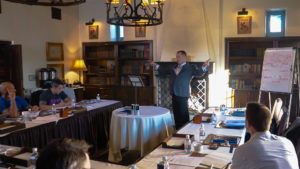The original version of this article was written almost two years ago as a clarion call validating the founding of my professional coaching firm, now called Leader’s Cut: The Ken Kilday Coaching Experience. Now in 2020, amid a global pandemic, murder hornets, and social upheaval in response to the murder of George Floyd by a police officer in Minneapolis caught on video. Current events have laid to bare superficial leadership in every facet of our lives. With edits to update, the case is as strong now as when the original was released, that we have a crisis of leadership in our country.
Zombie culture has taken over everything from pop culture to public protest (at least in Ohio) and business leadership has not managed to escape this threat. Corporations seeking to reduce turnover and create longevity are mindlessly gorging themselves on thought leadership concepts from foremost thinkers in leadership philosophy and regurgitating in their own businesses without truly digesting and incorporating the true meat of the message into their own leadership behaviors. The result, as one might expect, is messages fall flat, employees are dissatisfied, and leaders are struggling. Is it any wonder that employees when responding to 3rd-party surveys indicate they would trade a raise for a better leader, forego a raise to stay with a good leader, or often leave an organization they love to get away from a leader they do not?
In an ever-increasing tight labor market resulting in a continual fight for talent, the cost of this “zombie” mentality could be significant if leaders are unwilling to end the dissemination of others’ thoughts and instead chew on solving three specific barriers to leadership success.
The Feedback Fallacy
Leaders have more tools than ever to assess the mindset, engagement, attitude, and concerns of the employees entrusted to serve clients and leadership. It is an absolute truism that a client’s experience is limited in quality to the experience an employee has from their leader regardless of the level of the employee or leader.
It is also true that while the data doesn’t lie, the interpretation of the data often succumbs to confirmation bias and other obstacles that keep leaders from moving beyond their zombie-like script to a more modern leadership approach. We ask teams to complete the questionnaires, review their feedback, and then fail to address the heart of the issue because to do so would require leaders to open themselves up to receive suggestions or criticism and threaten their sense of authority and leadership. As a result, employees learn quickly to answer questionnaires in ways that create the least amount of work and thus become infected with the “zombie” mentality themselves. Zombie leaders have turned the gift of feedback to a soapbox for their memorized scripts and ego boosts.
In contrast, making the Leader’s Cut would take an honest assessment of their organization and themselves, report any new-found improvement opportunities to their teams, and commit to implementing solutions to enable growth and betterment of their teams individually and the company as a whole. Awareness of the needs of the team nourishes the team and creates a basis of trust and stability that helps create overall success.
I know what you said, I don’t know what you meant
It is suggested that only 7% of communication occurs verbally. The rest is relayed through non-verbal means like body language, voice inflection and perhaps most importantly, speaker credibility. Everyday employees encounter jargon-rich content in the emails, announcements, and intranet pages of their employers. When a leader sends such information without establishing the basis of trust and stability discussed in the previous section, the communication becomes akin to the guttural, nonsensical groans of a Zombie. What’s more, when given the chance to expound on a thought during a Q&A period, the Zombie Leader often either sticks to their memorized lines, entirely missing the underlying concern or angst from the team member, or dismisses the concern entirely thereby missing a moment to demonstrate their true caring for their people – which many companies describe as ‘their most important asset’.
A Leader who makes the Cut understands the importance of communication and works to ensure that written communication is consistent with spoken messages is free of jargon, and when reinforcing messages, listens carefully to fully understand questions and answers them specifically. One who makes the Leader’s Cut models clear, consistent messaging both publicly and privately and has true concern for both internal and external clientele to maintain efficacy as a leader.
It’s not personal, it’s just business
A zombie, by definition, is a mindless automaton moving through its given demographic seeking sustenance regardless of cost. While a zombie doesn’t consider the impact of his or her devouring the brain of a living being, there is quite clearly a negative impact to the victim. In a similar fashion, it is impossible to remove the “person” from a business decision that affects a person and, realistically speaking, all business decisions affect people. When working with people, decisions and actions are always personal. The phrase, ‘it’s not personal, it’s business’ demonstrates an impatience with the human reaction of a decision and a lack of awareness for the emotional impact.
A Leader who makes the Cut knows that employees are complete human beings who expect their work-family to care about them as does their home family and community. They earn trust by caring personally, investing emotionally, and inspiring loyalty by holding that trust as sacred. Teams that report to this level of Leaders know they can be real every single day. They courageously speak up and speak out. They offer the best of their intellect and heart on behalf of the client, their teammates, their Leader, and the company. These teams benefit from sustained productivity, engagement, low turnover, and high innovation.
While it is unlikely we will be subject to a zombie apocalypse, even in 2020, I suggest that most, if not all, have or will encounter a zombie leader. Their automatic, scripted communication and behavior can easily permeate even the best leadership environments and its effects can be not only demoralizing to the affected team, but also devastating to an organization as a whole. In order to defeat the Zombies, leaders must (re)discover their soul by elevating their abilities to make the Leader’s Cut. This means they take feedback to increase growth through awareness, raise personal standards of communication, and exhibit true concern and care for one’s work family. That’s the Zombie antidote.
Ken Kilday is a Vistage Chair in Northern Arizona, EOS Implementer, and Executive Coach focusing on individual strengths in service of the greater good. His passion for helping others achieve leadership excellence is the basis for coaching with challenge, engagement, and Opportunity at Leader’s Cut: The Ken Kilday Coaching Experience.




